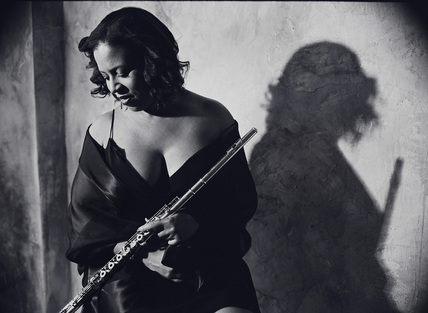
Valerie Coleman is a Grammy-nominated composer and flutist. She was a founding member of the Imani Winds wind quintet and is a current performer with the harp-viola-flute trio Umama Womama. She is also currently the Clara Mannes Fellow for Music Leadership at the Mannes School of Music, serving on the flute and composition faculty. Coleman has appeared with many orchestras, chamber groups, and on many records throughout her career.
She is also an accomplished composer and arranger. In 2019 and 2020, the Philadelphia Orchestra commissioned her to arrange Umoja and write “Seven O’Clock Shout,” respectively. Her piece Umoja has taken many forms, including wind quintet, concert band, and flute choir. The word umoja is the Swahili word for “unity” and is the word associated with the first day of Kwanzaa. The piece contains a call and response theme that represents unity in the music. Seven O’Clock Shout was written to celebrate the front line workers of the pandemic. The 2019 commissioning of her arrangement of Umoja marked the first time the Philadelphia Orchestra had played a piece by a living woman African-American composer.
Her compositions for the flute explore extended techniques and are written thoughtfully. As a flute player, she knows what will and will not work well, which allows for a relative ease in her compositions. In 2018 she wrote Fanmi Imen for flute and piano, based on Maya Angelou’s poem “Human Family.” Fanmi Imen is the Haitian Creole translation of the title, and Coleman beautifully depicts this poem through music. The poem is a powerful expression that all humans are more similar than different, which is a theme throughout all of Valerie’s works.
Hi Lianna,
ReplyDeleteThese are really interesting works by Coleman! I'm very touched by the background in each composition--unity, and especially unity during the pandemic.
-Lydia Lee
Hi Lianna! I really appreciated the detailed background you provided of Coleman being a founding member of Imani Wind Quartet and being on faculty at Mannes School of Music. I really enjoyed that you mentioned that she was commissioned by Philadelphia orchestra to create an arrangement of her piece "Umoja" as well as to write “Seven O’Clock Shout." "Fan Imen"("human family" in Haitian Creole) is such a stunning and powerful piece, her usage of Maya Angelou’s poem “Human Family” is so cool, I've never heard an instrumental piece use poems like this. Ending with 3 repetitions of “we are more alike than unalike” is so unifying, while still speaking to social issues. The intensification of the flute and piano playing as the piece goes on, as well as the experimentation with extended techniques, is extremely moving. Thank you for sharing! -Abby Ryan
ReplyDeleteValerie Coleman has always been such a light in the woodwind world. I think it was great to see a performance of her playing one of her own pieces. It was also incredible to learn more about a newer piece of hers that has such a strong message of hope, and community.
ReplyDelete- Laura Ruple
I loved Coleman's titles and how she incorporates African cultures and words in her pieces. Her compositional sound feels so warm and inviting. I definitely feel more connected with the human family listening to her works. What a wonderful way to express hope in people coming together, realizing the strength in their similarities and differences.
ReplyDelete-Hyrum Arnesen
Hi Lianna!
ReplyDeleteI am a fan of Valerie Coleman's works. I first was introduced to them through her wind quintets on Imani Winds CDs. Thank you for talking about her influences and culture that is brought into her works. I think its important to learn about those aspects while preparing to perform these works.
-Bryce Newcomer
Hi Lianna! Thanks for your music and blog. To understand her music "Fanmi Imen," I read the poem "Human Family." Her music demonstrates we are all basically the same, despite the differences between people. And her musical expression was dynamic and technical.
ReplyDelete- Haksung Lee
I knew very little about Valerie Coleman before reading this post, so I'm glad I finally got to learn a bit about her! Her musical style is so pleasant to listen to. I recently became acquainted with her Clarinet Sonatine, and I won't lie, I actually really want to perform it! I also think it's really neat how she incorporates aspects of African culture into her music - I find that that kind of cultural blending often creates some really great music!
ReplyDelete- Cameron DeLuca
DeleteHi, Lianna. This was interesting to read. I had heard of Valerie Coleman, but I am not very familiar with her music. I like Fanmi Imen a lot. I don't know much about the flute, but it sounds very difficult! You can definitely tell she is a flute player based on how well it is written. I also really like that she wrote the title of the piece in Haitian. Thank you for sharing! - Noah Ward
ReplyDeleteHi Lianna! This was amazing to read and learn about! I have actually never heard of her until your presentation/blog. I am curious to know more about her and explore her music. I enjoyed listening to the “Fanmi Imen”. Thank you for sharing! -Lydia Young
ReplyDelete